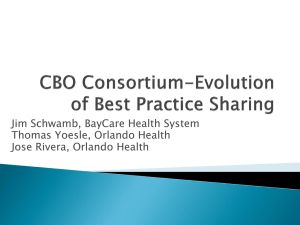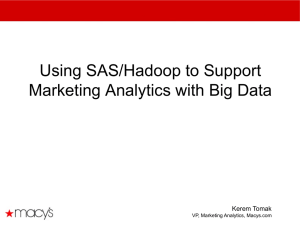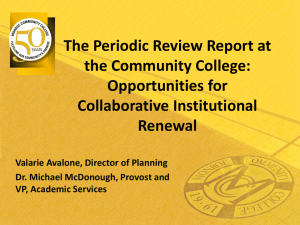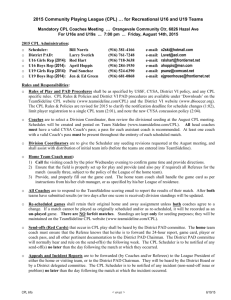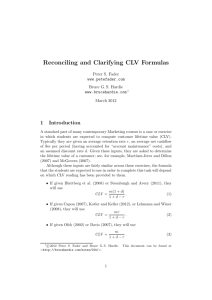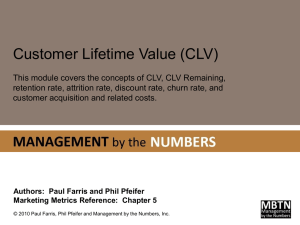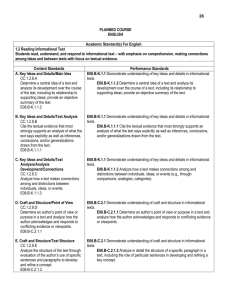Integrated Marketing
advertisement
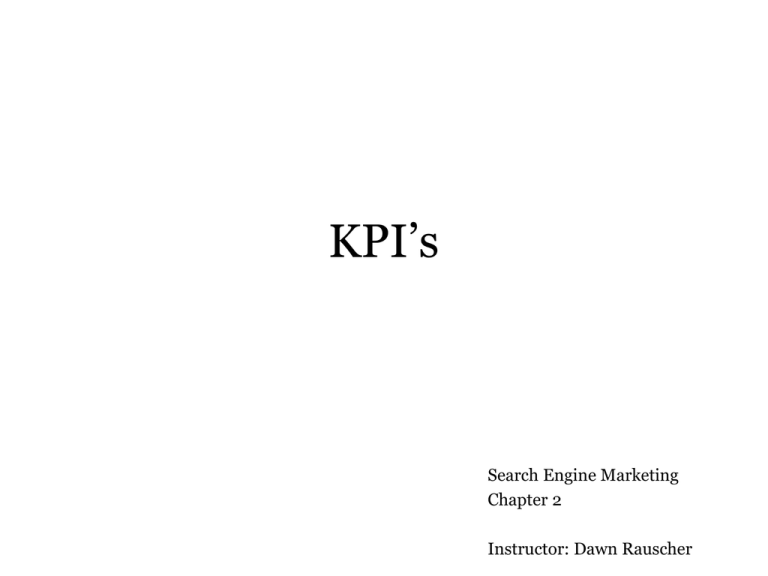
KPI’s Search Engine Marketing Chapter 2 Instructor: Dawn Rauscher Key Performance Indicators Metrics that guide and measure your progress toward your business goals. Helps you manage your marketing campaigns for maximum profitability 1. Set goals. 2. Measure the progress toward these goals. KPI-Driven Business Process 1. Define goals. You want to get more _________. (leads, sales, subscriptions, downloads, etc.) 2. Establish the target KPI’s. How much can you spend to still make a profit? 3. Launch Marketing Campaigns SEO, PPC, radio, TV. Set budgets based on KPI’s. 4. Measure actual KPI’s Collect the results. 5. Optimize your marketing channels. Improve the successful campaigns. Reduce the unsuccessful campaigns. 6. Communicate results to team. Average Order Value (AOV) This is the average value (in dollars) of your order. This assumes the items in a sale are in the same price range. If your orders include items with a wide range in price, you may need to develop KPI’s for different amount of sales. How to calculate your AOV • Divide your revenues by the number of orders Total Revenue / Number of Orders = AOV Example: In the last month, Jittery Joe’s had a total revenue of $48,240. The number of orders was 9140. What is the AOV? Customer Lifetime Value (CLV) The value of the revenue from the average customer over the lifetime of that customer. How to calculate the CLV • Multiply the AOV by the average number of orders by customers and the average lifetime of a customer. AOV * Number of Orders by a Customer per Year * Number of Years for Customer = CLV Example: The average number of orders by a customer per year is ten. An average number of years for a Jittery Joe’s customer is six. What is her customer lifetime value? Remember the AOV is $5.28. CLV (Customer Lifetime Value) • CLV for Jittery Joe’s is $316.80 • As a general rule of thumb says you should invest 10% of your customer lifetime value in acquiring a new customer. • How much should Jittery Joe’s invest to acquire a new customer? Relationships • CLV for Jittery Joe’s is $316.80 • If a customer refers one customer per year over a six year period, then the customer is worth $1900.00 Project Rate of Return (PRR) A marketing project can use a PRR value (usually 25%) This is how much your company must earn on its marketing to be profitable. With a 25% PRR, the revenue will be four times the investment. If you spent $1 in marketing, you should expect $4 in revenues. PRR Varies • Established company – Spend less and get more results – 10% • New company – Wants to grow aggressively, they will spend more to acquire new customers. – 50%, 70%, or higher Cost-per-Action (CPA) An action is the successful completion of a goal. How to calculate the CPA Multiply the CLV by the PRR CLV * PRR = CPA Example: Jittery Joe’s PRR is 25% and the CLV is $316.80 What is the CPA? Close Rate (CR) Ratio of how many leads turn into customers. Aim f0r a 30% to 50% close rate Number of Customers / Number of Leads * 100 Example: Jittery Joe’s can expect 12 customers for every 25 leads. What is the Close Rate? Cost-per-Lead How much a lead may cost A lead is a prospect or a contact that you then convert into a customer. How to calculate the CPL Multiply the CPA by the Close Rate (CR) CPA * CR = CPL Example: Jittery Joe’s CR is 48% and the CPA $79.20. What is the CPL? Jittery Joe’s Can spend up to $38 per lead and still be profitable. The close rate is 48% which is pretty high. Close Rate increases, the CPL increases. Close Rate decreases, the CPL decreases. The higher the CR, the more money a business can spend on a lead and still be profitable. KPI Worksheet Maximize your Cost Per Lead (CPL) • Advertising should be an investment and NOT a cost. • If the KPI model shows that you can spend $15/lead - SPEND IT! • Goal: Acquire customers to maximize your revenue Manage Campaigns with CPL • Multiple Channels – – – – – – – – – – – Google Yahoo Facebook Radio TV Print Bulk email SEO Link Building Direct Mail Billboards • Each Channel will have a different close rate – – – – Quality of ads Quality of competitors Unique Selling Point Sales Team Go After your Competitors’ Customers • Establish KPI’s • Aggressive bidding campaigns to target your competitors’ customers • Help customers get to better products (yours) Set your Baseline • Use a time period • Time period should be at least 1000 orders • With 1000 events, there is a 3% margin of error. • 3% error allows for making decisions with confidence Setting a Pay-Per-Click Budget for a New Product 1. 2. 3. 4. 5. 6. Estimate # of Sales you expect to make in one month to stay in business Guess at your Close Rate (CR). For every 100 leads, how many will become customers? Use the CR to estimate how many leads you’ll need to be able to make minimum number of sales. Calculate your CPL. Make best conservative guess. Multiply leads by CPL to get $ you can spend per month. Divide the monthly budget by 30 days to get daily budget for Google AdWords Example • Sell -- 100 koi per month • 50% close rate • Target CPL $10 How much will I need to spend a day for marketing? Need 200 leads to sell 100 koi $2000 per month on marketing $66 per day Setting a Budget for an Existing Product • 1. 2. 3. If you do not have any data, follow these steps. Set the target for monthly sales Use the KPI worksheet to calculate CPL Multiply the number of target sales by the target CPL (monthly campaign budget) 4. Divide monthly budget by 30 days to get daily budget for PPC Conclusion • Analytics, SEO, and PPC are the heart of your business. • Establish business goals • Define KPI’s • Set budgets & manage bids to get sales that produce the best profits.



